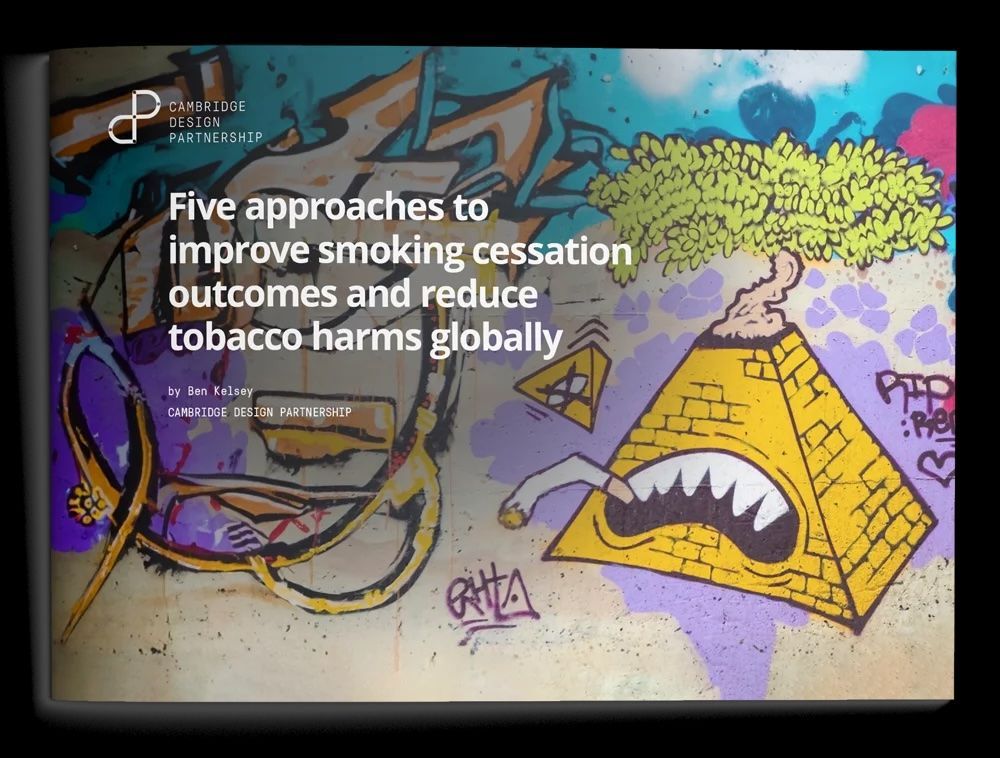Inter Scientific’s Regulatory Affairs Associate, Natalie Searle, discusses critical approaches to help the ongoing fight against tobacco usage.
Accelerating smoking cessation activities has become critical in the ongoing fight against tobacco usage.
Inter Scientific
are honoured to have collaborated with
Cambridge Design Partnership (CDP)
in their research initiatives funded by the
Foundation for a Smoke-Free World (FSFW).
We have explored the complex variables that affect quitting smoking, the key lessons learned from the research and the encouraging directions it points towards in the fight against the worldwide tobacco pandemic to accelerate the transition to a smoke-free future.
Preventable deaths
Smoking stands as the foremost cause of preventable deaths worldwide, with staggering statistics revealing that over eight million people succumb to its effects annually. Recognising the urgency of this global health crisis, the Foundation for a Smoke-Free World (FSFW) funded a comprehensive investigation led by Cambridge Design Partnership (CDP) to illuminate the current landscape of smoking cessation efforts. The dual-focused approached delved into the legal framework surrounding smoking cessation interventions while also probing the efficacy of these measures. CDP sought to understand nuanced attitudes and behavioural experiences of smokers and crucial insights that would inform the design and implementation of interventions tailored to smokers’ needs. This multifaceted examination yielded invaluable insights into the complex dynamics at play in the realm of smoking cessation, laying the groundwork for more effective strategies to combat this pervasive public health challenge.
Indeed, the challenge of behavioural change cannot be understated; humans are inherently complex beings and altering deeply ingrained habits such as smoking poses significant hurdles. While many smokers are motivated to break free from their tobacco dependence, they often find themselves lacking the necessary support to navigate this journey successfully.
Transformative shifts
It becomes evident that behavioural change is pivotal in the quest to eliminate smoking-related deaths and illnesses. Whether through complete cessation or transitioning to less harmful nicotine products, the imperative remains the same: smokers must embrace transformative shifts in their habits to safeguard their health and well-being. This aligns seamlessly with the visionary mission of the FSFW, which aims to eradicate combustible tobacco, toxic forms of tobacco, and smoking-related fatalities and diseases on a global scale, with a particular emphasis on low- and middle-income countries (LMICs).
Less harmful alternatives to combustibles
As advocates for public health and wellness, Inter Scientific urge public health officials and policymakers to take decisive action in fostering a more supportive environment conducive to motivating smokers to modify their habits. Introducing and implementing effective measures that encourage reductions in tobacco consumption, facilitate transitions to non-combustible alternatives, or support complete cessation are critical to protecting public health and our future generations. The role of industry in this endeavour is pivotal. Stakeholders must take proactive action to prioritize innovation and development to provide smokers with access to less harmful alternatives that offer a viable pathway to eventual cessation.
No smoke without fire
However, the aspiration of achieving a tobacco-smoke-free world within the next generation presents a formidable challenge. It necessitates the reassessment of our global approach to smoking cessation, with a renewed emphasis and education on harm reduction strategies. Accepting this paradigm change will surely be an essential first step in achieving our shared goal of a healthier, smoke-free future for future generations.
Download,
‘Five approaches to improve smoking cessation outcomes and reduce tobacco harms globally’ below:
“Having worked closely with Cambridge Design Partnership for over a decade, Inter Scientific were delighted to conduct the systemic review for their latest research initiative funded by FSFW ‘Five approaches to improve smoking cessation outcomes and reduce tobacco harms globally’. This collaborative effort allowed us to pinpoint five impactful approaches that hold the potential to positively influence tobacco cessation, advancing the conversation on tobacco harm reduction.” - David Lawson, CEO, Inter Scientific.
“We are very pleased to share our latest research initiative ‘Five approaches to improve smoking cessation outcomes and reduce tobacco harms globally’ funded by the FSFW and supported by Inter Scientific, who provided valuable regulatory expertise. Alongside our end-to-end product development services, CDP are passionate about educational research within Harm Reduction and are committed to reducing the eight million lives lost annually to smoking-related illnesses.” - Ben Illidge, Head of THR, Cambridge Design Partnership.
If you need support de-risking your product portfolio, contact us today.
#SmokingCessation
About Inter Scientific
With our combined analytical and regulatory services, we offer a single point solution for product compliance.
Our mission is to make regulatory compliance as straightforward as possible, allowing you to unlock global markets.
Inter Scientific is dedicated to providing quality scientific data and is multi-accredited against numerous international standards to ensure the highest level of quality, security and data integrity. With a world class laboratory supporting global product submissions and compliance combined with a dedicated specialist ENDS regulatory team, Inter Scientific brings innovative solutions for clients, ensuring the highest level of compliance in the UK, Europe, US and Middle-East.






